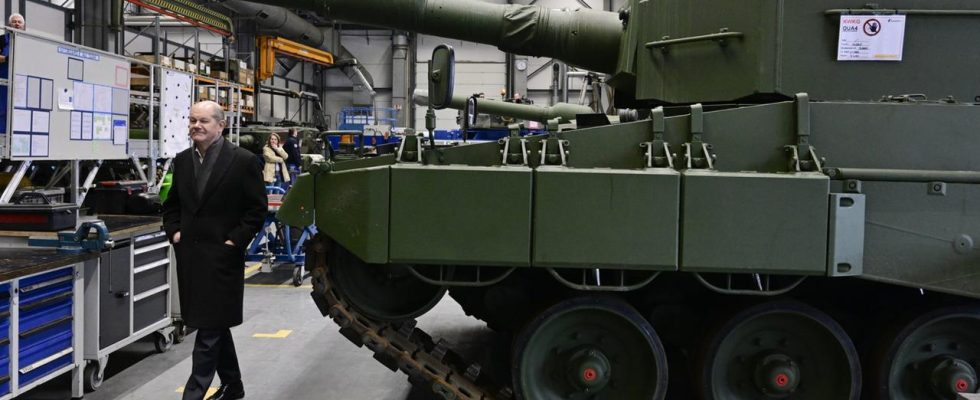Chancellor Scholz has laid the foundation stone for a new arms factory in the Lüneburg Heath. He sees this as just the beginning: Given the threat from Russia, many more weapons and ammunition are needed – for years to come.
Today, Chancellor Olaf Scholz combined the symbolic groundbreaking ceremony of a new plant owned by the arms company Rheinmetall with an urgent warning: “We do not live in times of peace,” said the Chancellor, referring to Russia’s war of aggression in Ukraine.
The “imperial ambitions” openly formulated by President Vladimir Putin are “a major threat to the European peace order.” In this situation, the following applies: “If you want peace, you have to successfully deter possible aggressors.”
Only one year of construction is planned
The new Rheinmetall plant in Unterlüß, Lower Saxony, will soon contribute to exactly this. The group expects construction to take just twelve months. In 2025, 50,000 artillery shells are expected to leave the new factory, the following year 100,000 and later 200,000 per year.
It primarily produces 155-millimeter artillery shells, as well as explosives and components for rocket artillery. Rheinmetall plans to invest a total of 300 million euros in the new plant and 500 jobs will be created.
Scholz sees the investment as the basis for independently and, above all, permanently supplying the Bundeswehr and its partners in Europe with artillery ammunition. This is particularly important with a view to Ukraine and its ammunition needs.
“So far we have made do by delivering a lot of what we had,” explained the Chancellor. But this is becoming less and less possible. “It is important that we do everything we can to increase production worldwide.” Rheinmetall’s new plant is an important signal here.
No howitzers on the shelf
A strong defense requires a solid industrial basis, emphasized Scholz. Ordering military equipment is not buying a car. It has to be planned for the long term. “Tanks, howitzers, helicopters and anti-aircraft systems are not on the shelf somewhere.” If nothing is ordered for years, “then nothing will be produced.” The Chancellor praised “how quickly Rheinmetall and other defense industry companies jumped into the breach.”
More European cooperation required
However, it is necessary for the Europeans to bundle their orders in the armaments sector and thus give the industry prospects for the next few years. “We have to move away from manufacturing and towards large-scale production of armaments,” said the Chancellor.
Federal Economics Minister Robert Habeck made a similar statement and also focused on the presidential election next November in the USA. There are still separate defense industries in each of the 27 EU states and not enough truly joint projects.
“We have to fight for Europe’s competitiveness in the world,” said the Green politician. “This explicitly includes the military complex.” Habeck said the election in the USA is still a long way away. A lot could still happen. There should be no nationalism; instead, more cooperation is needed.
The Republican US presidential candidate Donald Trump, who is given a good chance, recently caused horror with his statements about NATO. Trump had indicated that he did not want to help NATO partners in the event of an attack by Russia if they did not pay enough for the Western defense alliance.
Defense force Europe – as a complement to NATO
The appeal for closer European cooperation on arms issues also came from France today. President Emmanuel Macron said at a meeting with Polish Prime Minister Donald Tusk that everything the EU does to supply Ukraine with arms and ammunition must also serve to build up the European arms industry. “This will help us increase our production capacity and develop Europe into a defense force that complements NATO.”

